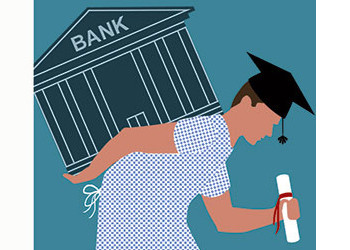Like many of their thirtysomething contemporaries, our adult offspring periodically find themselves struggling to make ends meet while paying off credit cards and other debts. Our son recently confided that he and his wife needed help with their car payment, for instance, and just last week our daughter reported that she’d banged up her car and could use a little cash to handle the insurance deductible and rental vehicle.
We’re happy to help out as much as we can, having gone through similar fiscal torment in our younger — and not so younger — years. We know how much stress those situations can cause and understand that they’ll eventually find solid financial footing as they grow older.
We hope so, at least, because carrying a heavy debt load in old age may be hazardous to your health.
That’s what researchers at the Urban Institute found after analyzing nearly 20 years of national data on seniors grappling with debt. The results of the study suggest these aging debtors were more likely than their debt-free counterparts to have been diagnosed with two or more chronic illnesses, including hypertension, diabetes, cancer, and heart disease.
“There seems a clear causal link between certain types of debts, especially at higher amounts, and negative health outcomes, both physical and mental,” senior researcher Stipica Mudrazija, PhD, tells the New York Times.
Americans have traditionally paid off their debts by the time they reach retirement age, but that’s no longer the case. Mudrazija and his team found that both the percentage of older adults in debt and the amount they owed have increased significantly in recent years. About 43 percent of Americans over the age of 55 were carrying debt in 1998, to the tune of $40,145 on average. That burden had risen to $62,784 (adjusted for inflation) by 2016, afflicting almost 57 percent of older Americans. For 15 percent of this cohort, their accumulated debt in 2016 represented an alarming 80 percent of their total assets.
“There’s a group of older people in financial distress,” George Washington University economist Annamaria Lusardi, PhD, tells the Times. “They’re highly leveraged; they’re carrying high-cost debt. They’re being contacted by debt collectors. They’re not going to enjoy their golden years.”
And, depending on the type of debt and the amount owed, there’s a decent chance they’re going to be less healthy than their debt-free contemporaries. Those who were struggling to pay off unsecured debt, such as credit cards and medical bills, tended to have more trouble handling ordinary daily activities. Meanwhile, those carrying secured debt, such as a home mortgage, were just as able-bodied as those carrying no debt.
The divergent effects of secured versus unsecured debt make sense, Mudrazija says, because secured credit is typically a planned investment. Unsecured debt, on the other hand, is often sought during an emergency. “You lose a job and have to live off a credit card,” he notes. “You get sick and face a huge hospital bill. The shock and stress might translate to deteriorating health.”
The connection, however, could go either way, he admits. Poor health and the costs of treating it could certainly contribute to higher debt.
Whatever the cause in any individual case, Lusardi believes employers should offer financial literacy training to their workers rather than simply focusing their attention on retirement savings. “We have made it very easy to borrow,” she argues. “We also need to help people make good decisions.”
I’m not sure My Lovely Wife and I can be of much help to our kids on the financial literacy front. More specifically, I’m not sure how much they’d listen to our advice after having watched us struggle through foreclosures, tax liens, bankruptcy, and other monetary misadventures. The fact that our only debt burden these days is our mortgage probably doesn’t mean as much to them as the fact that there always seems to be a little cash available when their own fiscal crises comes calling.





This Post Has 0 Comments